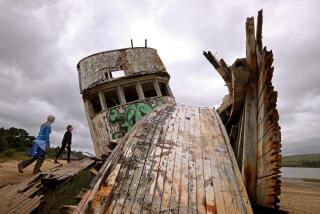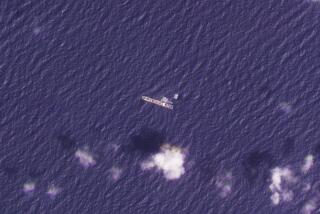Alaska’s $78-million ‘ferry to nowhere’ could land in L.A.
PORT MacKENZIE, Alaska — The late Sen. Ted Stevens is perhaps best remembered for the millions of dollars in federal booty he steered toward Alaska during his reign as chairman of the Senate Appropriations Committee.
One of the Republican senator’s more notable legacies was the construction of a $78-million amphibious assault vessel for the Navy — a military prototype that he diverted to his home state as a ferry to haul commuters from the rapidly growing suburbs north of Anchorage to jobs downtown.
A $4.5-million passenger terminal was constructed for the state-of-the-art, ice-capable catamaran, and the Matanuska-Susitna Borough proceeded with big plans to expand its port, link it to an interior railway and foster communities in the remote farm fields that surround the proposed ferry landing — defying critics across the country who held up the “ferry to nowhere” as an example of wasteful federal pork-barrel spending.
The vessel, named the Susitna, was built but never put into service. The end of Stevens’ reign in 2008 meant no more federal handouts, leaving little money to build landings, insufficient cash to subsidize operations and no means of convincing Anchorage to build a dock on the other side.
Officials in Matanuska-Susitna, or Mat-Su, not long ago announced they were offering the Susitna, free, to any government entity in the U.S. that would take it.
The borough’s best hopes are if the state of Alaska decides to integrate the Susitna into its ferry system, or if some private operator — it’s free only if it goes to another government entity — elects to buy it. Los Angeles County officials confirmed this week they are in “very preliminary” discussions about taking the vessel.
“We think a ship like that could provide us with a versatile public safety asset for emergency response, mainly to Catalina Island, where the ability to move people and equipment and firefighting apparatus is currently a challenge,” said Ryan Alsop, Los Angeles County assistant chief executive officer.
County firefighters must travel south to Camp Pendleton to load heavy equipment aboard Navy vessels for the trip to Catalina, Fire Inspector Brian Riley said.
Alsop said county officials also had discussed with the current passenger ferry operator, Catalina Express, the possibility of using the Susitna to carry passenger automobiles to the island. “We’ll hold some meetings, look at the boat, figure out the cost and all the logistics,” he said.
Government entities in several other states, as well as operators from Europe and Asia, have also expressed interest. The Alaska ferry system, which had initially said the Susitna would not fit at its docks, has decided to take a second look. Bids, including private offers, are scheduled to be reviewed on March 29.
“All we really want is to find a good home for it,” Borough Manager John Moosey said. They are running out of time.
The Borough Assembly reluctantly wrote another check recently for the vessel’s $80,000-a-month upkeep about 800 miles away in Ketchikan, fearful that they may be required to repay up to $13.5 million in federal transportation grants if they abandon it — but unsure how long they can afford to keep supporting a boat most Mat-Su residents have never seen.
“I think it goes without saying that there’s not a single person around this table that’s happy with this asset that we have that’s now a liability to the tune of $80,000 or $90,000 a month,” Warren Keogh cautioned fellow Borough Assembly members who have blustered about selling the boat for scrap. “But if we don’t fund this, would we be mildly stupid, moderately stupid or extraordinarily stupid?”
Mat-Su, often known as “the Valley,” is where former Republican Gov. Sarah Palin has her home in Wasilla. The population of the borough has grown 50% over the last decade, to about 93,000 people. The farming region, once known mainly for growing giant cabbages, is now known more for chain restaurants, department stores and affordably priced subdivisions.
Borough officials expect the population to reach as much as half a million over the next 50 years. A new $240-million state prison has opened near the port, where the ferry terminal has been drafted for port offices, and plans are underway for a $272-million rail line to link the port with the vast untapped mineral commodities of interior Alaska.
The problem is linking all that future development with downtown Anchorage, so close you can see it from Port MacKenzie across the 2.7-mile-wide finger at the top of Cook Inlet known as Knik Arm. Getting there by car takes an hour or more from the towns of Palmer and Wasilla, and even longer from where the borough is projecting much of its future growth.
Port Director Marc Van Dongen said the ferry became economically unworkable when designers cut the number of cars it could carry by more than half, to just 20.
“How can you justify spending $40 million [on docks] for just 20 vehicles going back and forth?” he said.
The real need, borough officials say, is not a ferry but a bridge. But that project is costly — at least $750 million — and controversial, threatening the historic neighborhood of Government Hill in northwest Anchorage.
“We always argued the ferry would help the bridge get built,” borough spokeswoman Patty Sullivan said. But that argument is “already dead,” she said, along with the borough’s hopes of giving a home to the Susitna.
“One of the premier naval architects in the world worked on this ship. It can crawl up on land, offload heavy equipment. It can handle rough sea swells. The ice just passes it by,” she said. “It’s a real beauty, and it just needs the right home, because our dream isn’t happening.”
More to Read
Sign up for Essential California
The most important California stories and recommendations in your inbox every morning.
You may occasionally receive promotional content from the Los Angeles Times.










